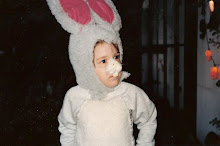...the way your ideals of beauty are a suspension of your own image, a projection of it out into the world, as a general framework within which you wait, until you encounter and incarnate beauty -- and precisely then you run the risk of ruining it. you yourself change from the suffering of this loss, and the ideal necessarily changes with you, moving close beneath your own flesh until the moment your consciousness lapses entirely, until the moment you die...
the appreciation of childhood, nostalgic or otherwise, then arises from precisely a desire to evade death and finitude yourself -- one seeks redemption and self-verification in the respite of possession, and especially here through possession of an object "childhood" one seeks to perpetuate one's own life, "in the abundance of its fertility," indefinitely. and at once excessive fixation on being-towards death is necessarily a pathos, necessarily pathological, for in thinking of mortality consciousness conceives of itself as dying. in pursuit of beauty we seek respite FROM mortality, and yet it is through thorough engagement with life that one is aware of oneself as beginning to age.
we can then explain at once why we find a conjunction of fertility and childishness, of sexuality and the youthful image, in popular media and popular ideals of the beautiful. a woman is sexually attractive, generally speaking, when she has disproportionately large eyes, or is from the waist-down tiny as a six-year old and from the waist up, pregnant. and it is through appreciating youth and fertility as beauty in a woman that man precisely can HAVE a child, recreate himself THROUGH their child, precisely distance himself from the imminence of his finitude -- though he also admits of this limitation IN the need to give himself sexually and emotionally to youthfulness as an OTHER in the woman and ultimately, also the child. age truly begins to decline once even one's children are grown. death awaits beyond self-fulfillment in this way. though in a patriarchal society this standard would apply only to women as objects of sexual desire, i should note that to the extent that when ANYONE finds this youth-oriented concept of beauty sexually attractive, they are likely facing the finitude of their own status, historically or personally, and attempting to surmount their own impotence in the same way men of a patriarchal society do -- thus particularly fitting is DeBeauvoir's questionably-phrased call for a "brotherhood" of men and women.
an ideal of beauty which fulfilled no more than the desperate need to affirm one's own virility and youth in the face of one's own weakness cannot be of any solace here, can it? and this is why it develops. but ultimately an ideal of beauty can only perhaps be of partial solace. the greater question is how to balance the corruptive force of power with the subjugative force of powerlessness in oneself -- for one is deceiving oneself to say that the appeal of the childish other, the innocent other, is not contingent on the perceived powerlessness of that childishness -- an attempt to gain immortality through projecting nostalgia for youth outward into an object of consumption. and if it is not possible to make oneself the object of one's own desires, through vagaries like the notion of self-realization (that is always also a disunification from the immediate self), we could then only explore the potential of an ascetic relinquishment of any attachment to the movement of desiring itself.
29.8.06
Subscribe to:
Post Comments (Atom)


No comments:
Post a Comment